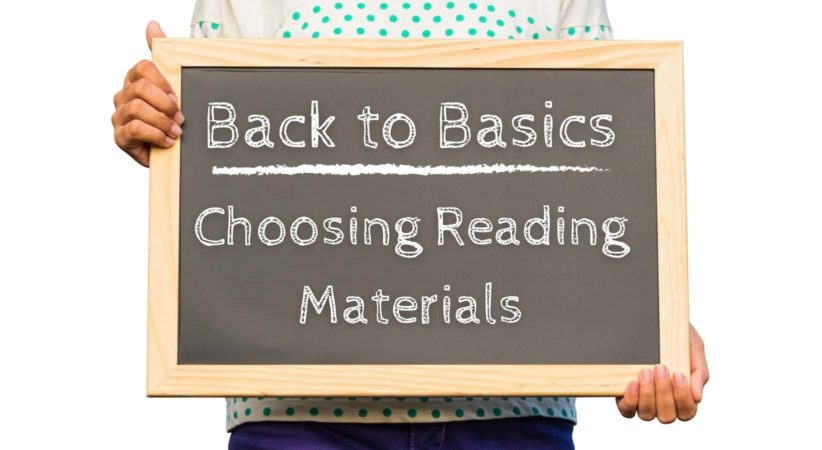
Back to Basics: Choosing Reading Materials
Welcome to our Back to Basics series! In this series we explore some of the foundational methods, practices and terminology for teaching reading and writing. This series is for those new to the field of literacy, beginning tutors or those who would just like a refresher. This week we discuss choosing appropriate reading materials.
Adult literacy learners can be incredibly diverse. They range in age, education, gender, ethnicity, income and more. This diversity can make it challenging to choose the appropriate reading materials for our unique learners.
Literacy reading materials can be broken into two categories: special materials and ordinary materials. Special materials are those written and produced specifically for literacy learners. These can include primers, readers, workbooks, and books written at the primary school level. Ordinary materials are the “real life” texts that learners are working towards reading and writing. This can include anything from fiction and non-fiction books, newspapers, street signs, government forms, social media and more. There are benefits and drawbacks to each type of material.
Special Materials
A benefit to using materials specifically written for adult literacy learners is that they often have been tested in the field. Children’s books are readily available and often offer good material to work with. However, tutors must evaluate whether the book written for children is appropriate to use with your adult learner. Workbooks and primers encourage the learner to “do” something while reading. This is thought to force the learner to more actively engage with the text. There are many benefits to using literacy special materials, but keep in mind that learners who learn to read a workbook are not necessarily then prepared to read ordinary materials. Tutors should also keep an eye out for the cultural and local relevancy of special materials.
“People who are taught to read a primer learn to read a primer, and may not learn to read other more useful material.” – Deryn Holland and Juliet Millican
Ordinary Materials
A good approach while choosing ordinary reading materials is to keep your learner’s interests in mind. The materials must be relevant to the learner so that they are more engaged with the text. It is also important to consider the age of your learner and to select materials that are age appropriate or adaptable to their age.
“People who are taught to decipher and to use ordinary, everyday materials, or those materials which are valuable to their everyday lives, are more likely to develop real literacy practices, as well as skills.” – Deryn Holland and Juliet Millican
Frontier College’s tutor guide Working with Adults lists more factors to consider while choosing reading materials:
- Choose materials that follow clear language and design principles.
- Choose materials at the appropriate level for the learner (challenging enough to learn new things but easy enough that they’re not too frustrated).
A successful literacy program often incorporates reading materials that are both special and ordinary. Check with your program coordinator for materials specific to the program, or those they have found useful in the past. Decoda’s literacy library has a wide selection of resources free for you to borrow. Contact the librarian to learn more. Be sure to also check with your local library for more adult literacy reading material. Read through the resources listed below for more advice and selections of great resources.
Resources
- Adult Literacy: A handbook for development workers – Part Four: Materials for Literacy
- A Frontier College Tutor’s Guide: Working with Adults
- Reader-friendly Fiction for Adults
- Reader-friendly Non-fiction for Adults
- Research to Practice: Text Considerations in Literacy Teaching and Learning
- Virtual Tutor Training Resources
Related Blog Posts
Poetry: Resources for Listening, Reading and Writing
April is National Poetry Month! This year’s theme is Weather. Find resources for teaching poetry.
Learning about Canadian elections
Today we’re welcoming two guest bloggers from Maria Kenward’s LINC 7/8 class at Windsor Neighbourhood Learning Centre. They write about their successful experience learning about elections in Canada. My first …
Reading and Writing Poems
Reading and writing poems have benefits. Get tips for teaching with poetry.
